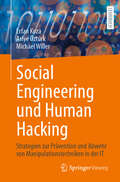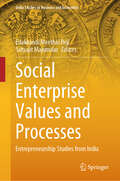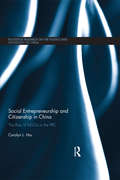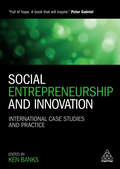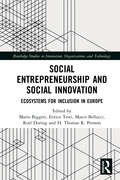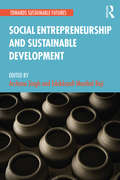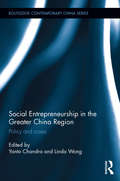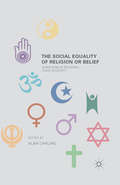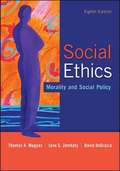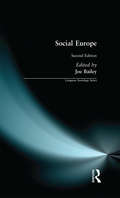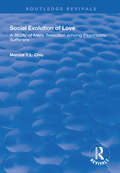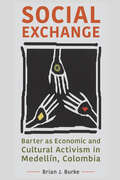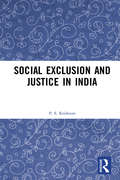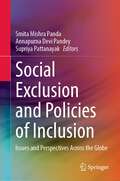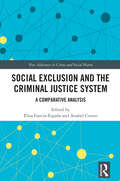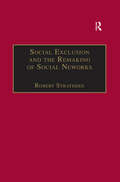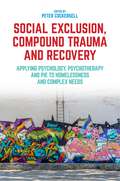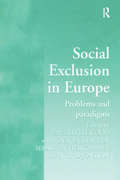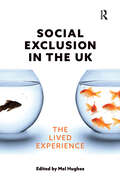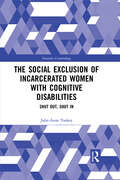- Table View
- List View
Social Engineering und Human Hacking: Strategien zur Prävention und Abwehr von Manipulationstechniken in der IT
by Erfan Koza Asiye Öztürk Michael WillerEntdecken Sie die psychologischen Tricks und Techniken, mit denen Human Hacker Ihre persönlichen Gefühle, Eigenschaften und digitale Verhaltensmuster ausnutzen, um die Informationssicherheit gezielt zu kompromittieren. Dieses Lehrbuch bietet Ihnen einen spielerischen Ansatz, um die Funktionsweise von Social Engineering zu verstehen und sich erfolgreich dagegen zu verteidigen. Erfahren Sie zudem, wie Sie Ihre Wahrnehmung schärfen, Ihre Emotionen kontrollieren und effektive Abwehrstrategien entwickeln können, um Ihre Daten und Ihr Unternehmen vor den Taktiken der Angreifer zu schützen. Ausgestattet mit psychologischen Denkmodellen sowie Abwehrstrategien, werden Sie bereit sein, sich den Herausforderungen des modernen Sicherheitsumfelds zu stellen.
Social Enterprise: At the Crossroads of Market, Public Policies and Civil Society (Routledge Studies in the Management of Voluntary and Non-Profit Organizations)
by Marthe Nyssens Sophie Adam Toby JohnsonIn one of its previous books, the EMES European Research Network traced the most significant developments in 'social entrepreneurship' emerging inside the third sector in Europe. Building upon that seminal work, this volume presents the results of an extensive research project carried out over a four-year period of a comparative analysis of 160 social enterprises across eleven EU countries. It breaks new ground in both its articulation of multidisciplinary theoretical frameworks and its rigorous analysis of empirical evidence based on a homogenized data collection methodology. Looking at work intergration, it is structured around a number of key themes (multiple goals and multiple stakeholders, multiple resources, trajectories of workers, public policies) developed through a transversal European analysis, and is illustrated with short country experiences that reflect the diversity of welfare models across Europe. With contributions from an impressive list of academics, all members of the EMES European Research Network, this rich follow-up volume to The Emergence of Social Enterprise is essential reading for academics, researchers and students in the fields of the third sector and social policies.
Social Enterprise in China: State-Third Sector Relations and Institutional Effectiveness (Routledge Contemporary China Series)
by Echo Lei WangWang offers an empirically based exploration into work-integration social enterprises as a means for delivering social services in China. Focusing on the political economy of social enterprise development in China, Wang examines the nature of the relationship between the state and social enterprises and the implications of such relationships for their institutional effectiveness. She adopts a bottom-up approach that investigates indigenous practices embedded within the local political context. Common ground has been established internationally that the social enterprise model provides new ways of social service delivery that could potentially change and restructure the social welfare economy. However, the development path differs across social contexts, especially in an authoritarian country like China. This study provides insights into China's efforts to develop its social welfare sector and reinvigorate customary ideas about how public services could be better offered given the country's political economy. This book will be of great interest to both scholars of China’s political economy and those with an interest in the development of the social enterprise sector looking to see how this works in a Chinese context.
Social Enterprise In Emerging Market Countries
by Nicole Etchart Loïc ComolliNESsT is an organization that develops sustainable social enterprises to solve critical social problems in emerging market economies. NESsT believes that social enterprise is a powerful tool that provides marginalized communities the skills, accessibility and technology needed to overcome social barriers and break the cycle of poverty. Drawing on NESsT's unique methodology for identifying and building the capacity of early-stage social enterprises, as well as on surveys of relevant stakeholders, Social Enterprise in Emerging Market Countries provides a clear picture of where social enterprises are and where they need to go, and identifies key players in the social enterprise field and how they can take the bold steps needed to facilitate the growth and impact of these models. Etchart and Camolli focus on NESsT's research in Latin America and Central Europe, the two regions where it has operated for over 15 years, particularly in Argentina, Brazil, Chile, Ecuador, and Peru, with some cases from other countries in Latin America. For the purpose of illustrating important models and innovative programs and policies, this book also highlights cases and experiences from Central Europe.
Social Enterprise Values and Processes: Entrepreneurship Studies from India (India Studies in Business and Economics)
by Satyajit Majumdar Edakkandi Meethal RejiThis edited volume is an interdisciplinary approach towards examining and integrating diverse theories, methodologies, and practices of social entrepreneurship. It highlights how social enterprises with their focus on resolving societal problems and driving social change, are critical for inclusive economic growth. The book is organized in three parts --- values, sustainability and social enterprise models; context, innovation and technology; and, perspectives and directions of future research in social entrepreneurship. The chapters contribute towards a better understanding of organizational and process dimensions of social and economic value creation, a relatively under-researched area in social entrepreneurship. They capture an extensive range of insights, analysis and case studies bringing together context specific dimensions and variables supportive of social enterprise creation and the development processes in social value creation. The book is useful for a wide range of audiences including social entrepreneurs, researchers, policy makers, development professionals, graduate and post graduate students seeking a deeper understanding of this evolving field. It also emphasizes practical guidance for individuals and organizations involved in social enterprise. It offers actionable insights, best practices, and real-world examples, enabling readers to apply the knowledge gained to their own contexts and effectively navigate the challenges and opportunities encountered in the field.
Social Entrepreneurship and Citizenship in China: The rise of NGOs in the PRC (Routledge Research on the Politics and Sociology of China)
by Carolyn L. HsuOver the last thirty years, social entrepreneurship has boomed in the People’s Republic of China. Today there are hundreds of thousands of legally registered NGOs, and millions more unregistered, working in the areas of the environment, education, women’s issues, disability services, community development, LGBTQ rights, and healthcare. The rise of these Chinese NGOs and their implications for civil society merits the focus of significant scholarly attention. This book draws upon the personal stories of social entrepreneurs in China, as well as their supporters and beneficiaries, in order to examine what the rapid growth of social entrepreneurship reveals about China's complex and dynamic society in the 21st century. It discusses the historical, cultural, and political circumstances that allowed and inspired people to become social entrepreneurs and create new forms of democratic engagement. Examining what social entrepreneurship with Chinese characteristics looks like, the book explores how it is changing the relationship between Chinese citizens and the state, and goes on to explain the subsequent effect on Chinese society. Highlighting the importance of citizen activism in the PRC from an interdisciplinary perspective, this book will be of interest to students and scholars of Chinese Studies, Chinese Politics, Civil Society and Sociology.
Social Entrepreneurship and Innovation
by Ken BanksSocial innovation and social entrepreneurship look for creative and affordable solutions to specific societal problems. Fuelled by the spread of the internet and the ubiquity of mobile phones, there are more people working to solve pressing social and environmental problems in the world today than ever before in human history. Social Entrepreneurship and Innovation presents the journeys of pioneering - and often accidental - social innovators who, faced with a problem, used their courage, tenacity and creative thinking to find a solution. Using their own words to reflect open their experiences, these cases do not gloss over the setbacks and the dead ends social entrepreneurs can face. Instead, readers will gain a realistic insight into the challenges and an engaging look at the problem-solving mindset needed to overcome them. From a life-saving project to bring solar-powered lighting to midwives in Nigeria, to a news dissemination service that's grown from small beginnings to have a global impact, each case study draws out the lessons learnt by the innovators, providing guidance and advice for those looking to follow in their footsteps. Social Entrepreneurship and Innovation is an invaluable resource for social entrepreneurs and innovators looking for new ideas and insight into what really works - and what doesn't. This book is an inspiring read for anyone with a social conscience and a desire to change their world for the better.
Social Entrepreneurship and Social Innovation: Ecosystems for Inclusion in Europe (Routledge Studies in Innovation, Organizations and Technology)
by Mario Biggeri Enrico Testi Marco Bellucci Roel During H. Thomas PerssonThis book provides comprehensive and advanced analysis of the characteristics of social entrepreneurship in Europe. It offers innovative, up-todate research on the ecosystems of social entrepreneurship, the behavior of social entrepreneurs, their ability to produce social innovation, social capital and social inclusion, and the role of stakeholders in fostering socially oriented businesses. Moreover, it addresses the diversity of the European social enterprise sector from an evolutionary perspective, with particular reference to the rise of social entrepreneurship and the role of new-generation social entrepreneurs throughout Europe. Multidisciplinary contributions authored by experts from business and accounting, economics, and sociology serve the purpose of delivering a holistic study of social entrepreneurship, also providing the necessary data for delivering policy implications on the features of the most effective enabling social and institutional ecosystems. The broad approach, based on different theoretical frameworks and methodologies across numerous disciplines, enables the authors to tackle all of the complex research issues connected to social entrepreneurship in the region. The book builds on the results of the European Union 7FP (European Union’s Research and Innovation funding program for 2007–013)-funded “EFESEIIS – Enabling the flourishing and evolution of social entrepreneurship for innovative and inclusive societies” research project. The central theme of the book is an evolutionary perspective on the dynamics and the rise of the social enterprise in Europe. This evolutionary perspective can be used in an economic as well as a social longitudinal analysis of changing contexts and entrepreneurial practices. The evolutionary perspective will be used as a tool to account for the specificity of developmental pathways in different contexts and countries.
Social Entrepreneurship and Sustainable Development (Towards Sustainable Futures)
by Archana Singh Edakkandi Meethal RejiThis volume discusses the seminal interface between social entrepreneurship and sustainable development along with their inter-linkages. It traces the role of social entrepreneurship and innovations in societal transformation in creating sustainable societies, especially in developing nations. It explores how social entrepreneurship and enterprise is integral to the promise of fostering opportunities for socially disadvantaged groups (including the poor, women, and young people), as well as in addressing environmental and ecological issues apart from wealth creation. The book presents key concepts, case studies, and multiple innovative models involving social entrepreneurship, such as green financing, serial social entrepreneurship, sustainable livelihood creation, and well-being, in addition to highlighting global sustainable development goals of the United Nations. The chapters are organised under the broad themes of sustainability of the organisation, sustainability of the community, sustainability of the development, and sustainability of the community–organisation interface. They examine social change, social innovation, social enterprise, small and micro-enterprises, microfinance institutions, inclusive growth, education, productivity, physical health, waste management, energy retention, self-reliance, and corporate social responsibility. They contain emerging research issues in the field as well as critical assessments while bringing together theoretical and practitioners’ perspectives. This book will be useful to scholars and researchers of development studies, social entrepreneurship, sustainable development, environmental studies, public policy, and political sociology. It will also greatly interest professionals from non-profit, corporate, and public sectors, other development practitioners, and international bodies.
Social Entrepreneurship in the Greater China Region: Policy and Cases (Routledge Contemporary China Series)
by Linda Wong Yanto ChandraThis book offers the first exploration into the development of social enterprises in the Greater China region, consisting of Hong Kong, Macau, Taiwan and Mainland China. By drawing on the research and experience of over a dozen scholars and practitioners from across the area, it offers a picture of how a strong State can play an important role as a catalyst in developing the social entrepreneurship sector, particularly by legitimizing it. It delves into the role and impact of institutions and policy on the development of social enterprises, and explains how micro and macro factors might interact in influencing social entrepreneurship. Structured in two parts – policy and cases – it reveals the historical development of the Social enterprises sector in the Chinese context and then illustrates this using cases studies. Providing an alternative view of social entrepreneurship by highlighting the importance of context in this new sector, the book questions whether or not social entrepreneurship is preferable to more conventional models of development. Sparking new interest and offering fresh insight into social entrepreneurship in the Greater China region, this book will be useful to students and scholars of Chinese Studies, Business Studies and Sociology.
The Social Equality of Religion or Belief: A New View Of Religion's Place In Society
by Alan CarlingSome countries, like the UK, give special recognition by the state to one or a few religions; other countries, like France and the US, give recognition to none. This book is about a new approach that gives equal recognition to all religions and non-religious belief systems.
Social Ethics: Morality and Social Policy
by Thomas Mappes Jane Zembaty David DegraziaWith an assortment of readings and perspectives from some of the most respected thinkers of our time, Social Ethics: Morality and Social Policy provides a balanced, engaging introduction to today's most pressing social and moral problems. This highly popular anthology illuminates the issues at the heart of each contemporary problem and encourages critical, fair-minded examination of varying viewpoints--all presented in the words of those who embrace them. Helpful editorial features include substantial chapter introductions, a summary preceding each selection, discussion questions, and bibliographies for further reading.
Social Europe (Longman Sociology Series)
by Joe BaileySince the first edition of Social Europe was published in 1992 profound social changes have occurred throughout Europe as a result of conflicting pressures on the one hand to become more integrated and on the other to protect national interests and identity. This second edition of Social Europe has been fully revised to provide a comprehensive and focused account of basic social issues and structures which provide the context for these changes. Each chapter covers a key topic such as education, crime, gender, health and religion and provides valuable comparisons between the key nation states of Western Europe.
Social Evolution of Love: A Study of Mate Selection Among Psychiatric Sufferers (Routledge Revivals)
by Marcus Y.L. ChiuFirst published in 1999, this volume explores whether people with psychiatric problems would have spouses with similar psychiatric problems started with a series of concordance studies. Marcus Y.L. Chiu begins with a four-chapter literature review examining mental illness among spouses of psychiatric patients, psychological and sociological perspectives, genetics and evolution and key ethical issues. Chiu’s study then proceeds to shed some light on a personality dimensions, marital satisfaction and how one can better adapt to the environment by creating a social milieu through marriage that is accepting, understanding, and less demanding.
Social Evolution, Political Psychology, and the Media in Democracy: The Invisible Hand In The U. S. Marketplace Of Ideas
by Peter BeattieThis book analyzes why we believe what we believe about politics, and how the answer affects the way democracy functions. It does so by applying social evolution theory to the relationship between the news media and politics, using the United States as its primary example. This includes a critical review and integration of the insights of a broad array of research, from evolutionary theory and political psychology to the political economy of media. The result is an empirically driven political theory on the media’s role in democracy: what role it currently plays, what role it should play, and how it can be reshaped to be more appropriate for its structural role in democracy.
Social Exchange: Barter as Economic and Cultural Activism in Medellín, Colombia
by Brian J. BurkeMoney occupies a powerful place in our lives – it is a problem, a goal, and motivator, a measure of self-worth and national progress, and even an influence on how we relate to each other and to nature – but what happens when communities start to reinvent money and markets? Over the last twenty-five years, grassroots activists in Medellín, Colombia, have used barter markets and community currencies as one strategy to re-weave a social fabric shredded by violence and to establish an economy founded on respect and reciprocity rather than exploitation. In Social Exchange, Brian J. Burke provides a deep ethnographic investigation of this activism and its effects. This story draws us into the cultural and material effects of capitalism and narco-violence, while also helping us understand what new radical imaginations look like and how people bring them to life. The result is an intimate glimpse of urban life in Latin America, as well as a broader analysis of non-capitalist or post-capitalist possibility.
Social Exclusion and Justice in India
by P. S. KrishnanThis book draws upon nearly seven decades of first-hand experiences from the ground to understand social exclusion, and movements and efforts for social justice in India. The author, a renowned champion of social justice for deprived social classes, delves into the roots of discrimination in Indian society as well as explains why caste discrimination still persists and how it can be effectively countered. The volume: examines the caste system and its socio-economic ramifications from the perspective of Dalits, and Socially and Educationally Backward Classes; explores the nuances of the Gandhi–Ambedkar debate on the status and liberation of Dalits and synthesis of the approaches of Gandhi, Ambedkar, Narayana Guru and Marx in resolving certain key issues; analyses legal, economic, social and cultural frameworks to understand caste system and related concepts such as ‘untouchability’, atrocities, reservation, etc. in contemporary India; and provides practical insights into the Constitution-based comprehensive measures required to remedy the consequences of caste system and establish social equality in a holistic manner. The book will interest scholars and researchers of social exclusion and social justice, Dalit, Adivasi and Backward Classes studies, sociology and social anthropology, politics, law and human rights, as well as policy-makers, think tanks and NGOs in the field.
Social Exclusion and Policies of Inclusion: Issues and Perspectives Across the Globe
by Smita Mishra Panda Annapurna Devi Pandey Supriya PattanayakThis book brings together cross-cultural perspectives on political economy of social exclusion and a critical view of policies of inclusion. The themes covered are political economy of social exclusion; inclusionary policy outcomes; persistent challenges to social exclusion and rethinking social exclusion and inclusion. The contexts are located in varied geographies including India, South East Asia, USA, Canada, Mexico, Australia and Papua New Guinea. The book throws light on how, historically, social inclusion of various excluded communities has always been a part of nation building with varying results. Furthermore, it highlights how the terrain of social exclusion is becoming increasingly complex today. It provides the space to reimagine issues of inclusion and exclusion within the social policy landscape of a country. It provides ways to rethink policies of inclusion such that dialogue between the excluded and the state is enhanced, and the systems of seeking justice for a dignified life, peace and freedom are improved. It appeals to policy makers, academicians and practitioners of development and social policy studies, planning and governance in both developing and developed countries.
Social Exclusion and the Criminal Justice System: A Comparative Analysis (ISSN)
by Elisa García-España Anabel CerezoThis book presents the results of the latest in a long-running research project using the RIMES instrument, developed by scholars in Spain. Here, RIMES is used to measure the extent of social exclusion resulting from the penal system in comparative perspective. The volume shows the results of the application of the instrument in seven criminal justice systems: Germany, Italy, Spain, Poland, England and Wales, California, and New York.Divided into two parts, the first provides a general overview of the RIMES instrument, including a discussion of the theoretical model and the methodology. The second part focuses on the results of the application of RIMES in the seven jurisdictions. The comparative results are organised according to the nine dimensions included in the RIMES instrument: control of public spaces; legal safeguards; sentencing and sanctions systems; harshest penalties; prison rules; preventive intervention; legal and social status of offenders and ex-offenders; police and criminal records; and youth criminal justice. The last chapter summarizes the comparative results and ranks them in terms of the findings on social exclusion.The book will be of interest to academics, researchers and policy-makers working in the areas of Comparative Criminal Justice, Criminology, Criminal Law and Policy.
Social Exclusion and the Remaking of Social Networks (Voices in Development Management)
by Robert StrathdeeHow do young people make effective transitions into work? This question has occupied the minds of parents and young people, and also researchers and policy makers, as they face up to challenges presented by globalization and technological change. The foremost governmental response to this challenge has been to expand training systems to improve young people's qualifications. However, it is clear that for many this response has failed to deliver the promised rewards and the legitimation of this strategy has been exhausted. This book explores developments in training and in social welfare to show that third way administrations in England and New Zealand are reconnecting young people to the labour market through creating social networks. Social Exclusion and the Remaking of Social Networks describes how networks are being remade by the state in commodified forms.
Social Exclusion, Compound Trauma and Recovery: Applying Psychology, Psychotherapy And Pie To Homelessness And Complex Needs
by Peter Cockersell John Connolly Nicola Saunders Dr Emma Williamson Catriona Reid Dr Sally Read Terry HuttonResponding to the growing number of psychologically-informed services for people experiencing social exclusion and, in particular, homelessness, this book gives professionals the information and understanding they need to be fully informed in their practice with this client group. It begins with theory, looking at the psychology of social exclusion and the processes that underlie it, and considers the relationship between trauma, complex needs, homelessness and social exclusion. Presenting practical interventions and case studies, the authors then reveal what makes an effective service in practice and a client perspective on social exclusion and recovery is provided. This is essential reading for all those involved in developing services that meet the needs of socially excluded people with histories of complex trauma or presentations of complex needs, including those who are homeless, refugees and asylum seekers, Traveller and Roma communities and people involved with the criminal justice system.
Social Exclusion in Europe: Problems and Paradigms
by Paul Littlewood Ignace Glorieux Ingrid JönssonExclusion has come to hold a prominent place in the political discourse of all governments in the European Union and in the European Commission itself. As such, it figures importantly in various research agencies’ funding priorities attracting academics to develop and conduct major research programmes. But what does it mean? This book analyzes the different meanings the term exclusion has come to convey and surveys a wide variety of actual applications in different European countries.
Social Exclusion in Later Life: Interdisciplinary and Policy Perspectives (International Perspectives on Aging #28)
by Kieran Walsh Thomas Scharf Sofie Van Regenmortel Anna WankaDrawing on interdisciplinary, cross-national perspectives, this open access book contributes to the development of a coherent scientific discourse on social exclusion of older people. The book considers five domains of exclusion (services; economic; social relations; civic and socio-cultural; and community and spatial domains), with three chapters dedicated to analysing different dimensions of each exclusion domain. The book also examines the interrelationships between different forms of exclusion, and how outcomes and processes of different kinds of exclusion can be related to one another. In doing so, major cross-cutting themes, such as rights and identity, inclusive service infrastructures, and displacement of marginalised older adult groups, are considered. Finally, in a series of chapters written by international policy stakeholders and policy researchers, the book analyses key policies relevant to social exclusion and older people, including debates linked to sustainable development, EU policy and social rights, welfare and pensions systems, and planning and development. The book’s approach helps to illuminate the comprehensive multidimensionality of social exclusion, and provides insight into the relative nature of disadvantage in later life. With 77 contributors working across 28 nations, the book presents a forward-looking research agenda for social exclusion amongst older people, and will be an important resource for students, researchers and policy stakeholders working on ageing.
Social Exclusion in the UK: The lived experience
by Mel HughesIn UK society, there are cultural norms and assumptions that affect many marginalised groups and this book aims to address and challenge these through the lens of the people who have lived these experiences.Social Exclusion in the UK presents a range of lived experiences alongside a critical commentary on the impact of social stigma, exclusion and marginalisation on people's lives. This book's chapters are co-authored by people with lived experience and academics and are all underpinned by the Transformative Learning Theory developed by scholar Mezirow. The marginalised experiences discussed in this book include different types of substance users, care leavers, asylum seekers, offenders, HIV positive, those living in poverty or those who identify as transgender.What makes this book unique is that it gives a voice to those who have been the most affected by inequality - whether it's economic or social and health inequalities. Those affected are the least likely to be involved in shaping and informing responses to it and this lack of involvement risks the further exclusion of those who are already marginalised.A few of the ways this book aims to challenge this include: legitimising and prioritising lived experience expertise; fostering critical reflection of our own beliefs and assumptions and drawing on lived experience expertise to inform responses and solutions.
The Social Exclusion of Incarcerated Women with Cognitive Disabilities: Shut Out, Shut In (Feminist Criminology)
by Julie-Anne TooheyThe Social Exclusion of Incarcerated Women with Cognitive Disabilities explores the lived experience of cognitively disabled women incarcerated in Australia. It draws upon in-depth interviews with Indigenous and non-Indigenous women, as well as interviews conducted with prison practitioners – psychologists, counsellors, and Aboriginal Liaison Officers. Using a theoretical framework of social exclusion, the book charts the complex intersection between cognitively disabled women and the Criminal Justice System, and how this connection works to foster and maintain a state of social exclusion prior to incarceration, and equally, within the prison setting. The book also provides a practical template for other researchers to use when investigating the aligned fields of the Criminal Justice System and incarceration, women offenders, cognitive disability, and social exclusion. By placing the voices of the incarcerated women with cognitive disabilities ‘front and centre’, a new and innovative approach to social exclusion emerges. The book moves beyond the 'telling of sad stories' to examine the social and political climate that permits disadvantage, inequality, and injustice to flourish. This book will be of great interest to academics and students in criminology, criminal justice, disability studies, women’s and gender studies, and penology. In exploring theory in a practical way, it will also be of use to those involved in the health sector, community services, disability support agencies, disability advocates, prisoner advocacy, women’s studies and women’s advocacy, and human rights activism.
